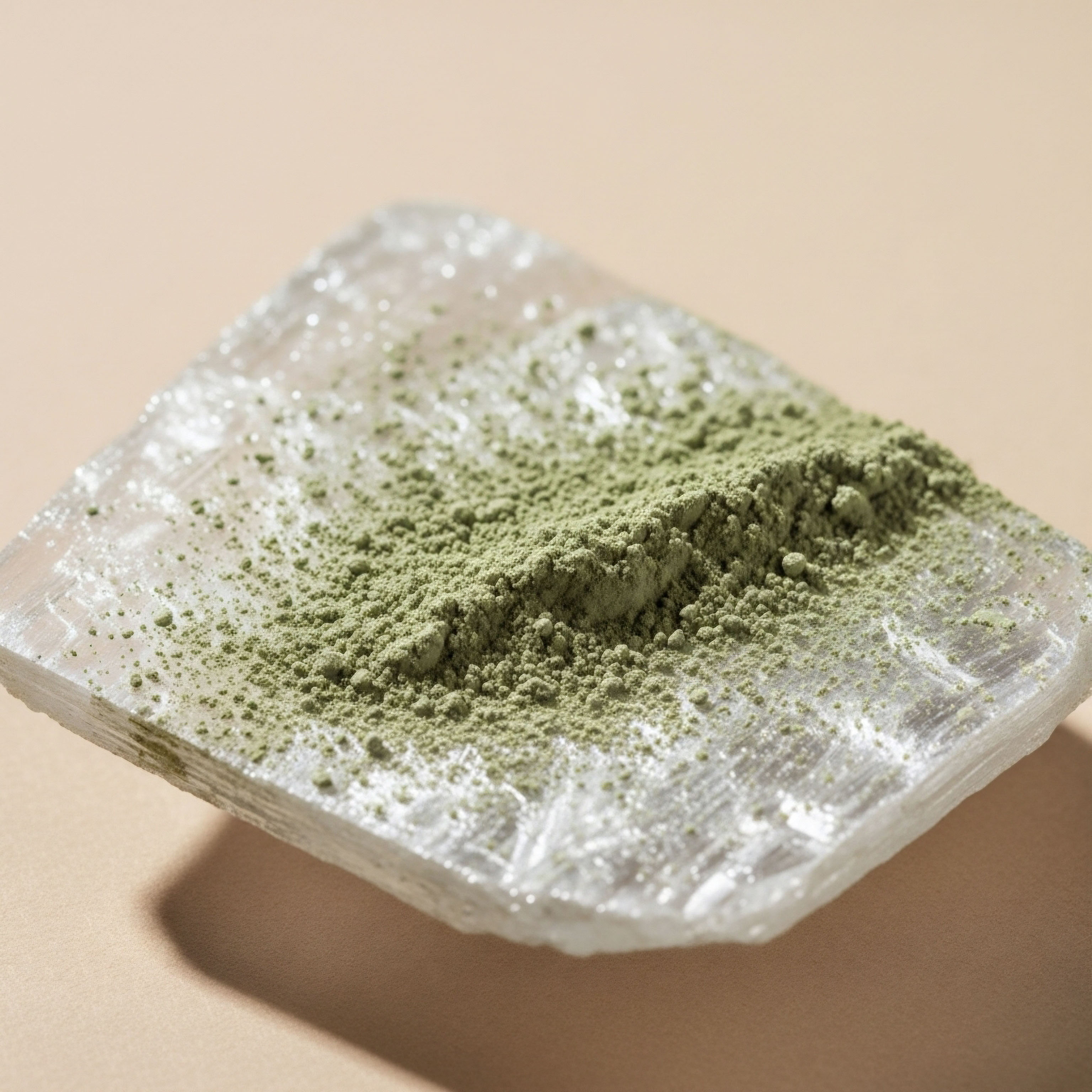

Fundamentals
Have you ever found yourself grappling with a persistent mental fog, a subtle yet unsettling decline in your ability to recall names, or a general sense that your cognitive sharpness is not what it once was? Perhaps you experience moments of reduced mental clarity, a feeling that your thoughts are less fluid, or that sustained concentration has become more challenging.
These experiences, while often dismissed as simply “getting older,” can be deeply disquieting, prompting a quiet concern about the trajectory of your mental vitality. It is a deeply personal experience, one that can subtly erode confidence and diminish the vibrancy of daily life. Understanding these shifts, acknowledging their impact, and seeking clarity on their origins marks a pivotal step toward reclaiming your full potential.
The human body operates as an intricate network of interconnected systems, each influencing the others in a delicate balance. Among these, the endocrine system, with its array of chemical messengers known as hormones, plays a particularly significant role in orchestrating processes far beyond mere physical growth.
These biochemical signals act as the body’s internal communication network, relaying instructions that govern everything from metabolic rate to mood regulation and, critically, cognitive function. When this system experiences imbalances, the effects can ripple throughout the entire physiological landscape, often manifesting as the very symptoms that prompt your concern.
Central to this discussion is growth hormone (GH), a polypeptide produced by the pituitary gland, a small but mighty organ nestled at the base of the brain. For many, the term “growth hormone” conjures images of childhood development and physical stature.
While GH is indeed essential for linear growth during formative years, its influence extends far into adulthood, playing a continuous role in tissue repair, metabolic regulation, and maintaining overall physiological equilibrium. As individuals age, the natural secretion of GH tends to decline, a phenomenon sometimes referred to as somatopause. This age-related reduction in GH levels is not merely an isolated event; it represents a systemic shift that can affect various bodily functions, including those related to mental acuity.
The body’s natural production of growth hormone follows a pulsatile pattern, with bursts of secretion occurring throughout the day, most notably during deep sleep. This rhythmic release is orchestrated by the hypothalamus, which sends signals to the pituitary gland. When GH is released, it stimulates the liver and other tissues to produce insulin-like growth factor-1 (IGF-1).
IGF-1 acts as a primary mediator of many of GH’s effects, influencing cellular growth, metabolism, and repair across numerous organ systems. The GH-IGF-1 axis represents a critical feedback loop, where adequate levels of these hormones are essential for maintaining tissue health and functional integrity.
Growth hormone peptide therapy aims to support the body’s inherent capacity to produce and release its own growth hormone, rather than introducing exogenous synthetic growth hormone directly.
Growth hormone peptide therapy involves the administration of specific peptides that act as secretagogues, meaning they stimulate the pituitary gland to release more of its own endogenous growth hormone. This approach differs from direct human growth hormone (HGH) replacement, which introduces synthetic GH into the system.
The rationale behind peptide therapy is to work synergistically with the body’s natural physiological processes, encouraging a more natural, pulsatile release of GH. This method seeks to optimize the body’s internal signaling pathways, promoting a more balanced and sustained endocrine response.
The concept of supporting the body’s innate mechanisms for hormone production holds significant appeal for those seeking to address age-related declines in vitality. Rather than overriding the system, these peptides work to recalibrate it, encouraging the pituitary gland to function more robustly.
This recalibration can have widespread effects, impacting not only physical attributes like body composition and recovery but also more subtle yet equally important aspects of well-being, such as sleep quality and cognitive performance. Understanding this foundational principle is key to appreciating the potential long-term outcomes of such therapeutic interventions.


Intermediate
As we move beyond the foundational understanding of growth hormone and its systemic influence, a closer examination of specific therapeutic protocols becomes essential. Growth hormone peptide therapy employs a range of agents designed to modulate the body’s natural GH secretion.
These peptides are not identical in their mechanisms; rather, they offer distinct pathways to support the pituitary gland’s function, each with its own unique characteristics and applications. The goal remains consistent ∞ to encourage a more youthful and robust release of endogenous growth hormone, thereby influencing a spectrum of physiological processes, including those related to mental acuity.
The primary peptides utilized in this therapeutic modality are classified as growth hormone-releasing hormone (GHRH) analogs and growth hormone-releasing peptides (GHRPs). GHRH analogs, such as Sermorelin and CJC-1295, mimic the action of the naturally occurring GHRH, which is produced by the hypothalamus. This hypothalamic hormone signals the pituitary gland to release GH.
By administering these analogs, the pituitary receives a stronger, more consistent signal, prompting it to increase its output of growth hormone. Sermorelin, for instance, is a shorter-acting GHRH analog, often administered daily to mimic the body’s natural pulsatile release. CJC-1295, particularly with its Drug Affinity Complex (DAC) modification, offers a longer half-life, allowing for less frequent dosing while still providing sustained stimulation of GH and IGF-1 levels.
GHRPs, including Ipamorelin, Hexarelin, and MK-677 (Ibutamoren), operate through a different mechanism. They act on the ghrelin receptors in the pituitary and hypothalamus, directly stimulating the release of GH. Ipamorelin is often favored due to its selectivity for GH release, minimizing the stimulation of other hormones like cortisol or prolactin, which can be associated with some older GHRPs.
The synergistic application of a GHRH analog and a GHRP is a common strategy, as research indicates that combining these two classes of peptides can lead to a more significant and sustained increase in GH secretion than either agent alone. This combination aims to replicate the natural rhythm and amplitude of youthful GH pulses.
Consider the body’s endocrine system as a complex orchestral performance. GHRH analogs act like the conductor’s primary cue, signaling the pituitary (the orchestra) to begin playing its growth hormone symphony. GHRPs, conversely, might be seen as individual musicians within the orchestra, directly prompting their sections to play with greater enthusiasm and frequency.
When both cues are provided in harmony, the resulting performance ∞ the release of growth hormone ∞ is more robust and coordinated. This coordinated action is thought to contribute to the broad spectrum of reported benefits, extending to cognitive function.
The influence of these peptides on cognitive function is a subject of growing interest. Clinical observations and some preliminary studies suggest that optimizing GH and IGF-1 levels can contribute to improvements in various cognitive domains. These potential benefits are not merely anecdotal; they are rooted in the known physiological roles of GH and IGF-1 within the central nervous system.

How Do Growth Hormone Peptides Influence Brain Function?
The mechanisms by which growth hormone peptides may support cognitive health are multifaceted. They extend beyond simply increasing circulating GH levels to influencing cellular processes within the brain itself.
- Neurogenesis Support ∞ Growth hormone and IGF-1 are known to promote the growth of new neurons, particularly in the hippocampus, a brain region critical for learning and memory. This process, known as neurogenesis, is vital for maintaining cognitive plasticity and adaptability throughout life.
- Neuronal Health and Survival ∞ These hormones also contribute to the survival and health of existing neurons, protecting them from damage and supporting their metabolic needs. This neuroprotective effect can be significant in mitigating age-related neuronal decline.
- Modulation of Neurotransmitters ∞ Growth hormone peptides can influence the levels and activity of various neurotransmitters, including serotonin, dopamine, and gamma-aminobutyric acid (GABA). These chemical messengers are fundamental to mood regulation, attention, and overall cognitive processing. Balanced neurotransmitter activity can lead to improved focus, emotional stability, and reduced anxiety.
- Enhanced Cerebral Blood Flow ∞ Adequate blood flow to the brain ensures a consistent supply of oxygen and nutrients, which are essential for optimal neuronal function. Some evidence suggests that growth hormone may enhance cerebral blood flow, thereby supporting metabolic activity within brain cells and improving cognitive performance.
- Improved Sleep Architecture ∞ Deep, restorative sleep is critical for cognitive consolidation and overall brain health. Certain growth hormone peptides, particularly Ipamorelin and CJC-1295, are reported to promote slow-wave sleep (SWS), the deepest stage of non-REM sleep. During SWS, the brain actively processes and consolidates memories, clears metabolic waste products, and facilitates neuronal repair. Improved sleep quality directly translates to enhanced daytime cognitive function, including memory, attention, and problem-solving abilities.
The specific protocols for growth hormone peptide therapy are tailored to individual needs, considering factors such as age, baseline hormone levels, and specific health goals. A typical protocol might involve subcutaneous injections, often administered nightly to align with the body’s natural GH release patterns during sleep. Dosing strategies vary, with some protocols recommending daily administration for five days followed by a two-day break, or cyclical usage with periods of active therapy followed by breaks to prevent receptor desensitization.
While the immediate effects of improved sleep, energy, and body composition are often noticeable, the long-term cognitive outcomes are a subject of ongoing clinical investigation. The premise is that by supporting the fundamental processes of neurogenesis, neuronal protection, and optimized brain metabolism, these therapies can contribute to sustained cognitive vitality.

Growth Hormone Peptide Therapy Protocol Overview
| Peptide Class | Key Peptides | Mechanism of Action | Typical Dosing Pattern |
|---|---|---|---|
| GHRH Analogs | Sermorelin, CJC-1295 | Mimic hypothalamic GHRH, stimulating pituitary GH release. | Daily (Sermorelin), 1-2x weekly (CJC-1295 with DAC) |
| GHRPs | Ipamorelin, Hexarelin, MK-677 | Directly stimulate pituitary GH release via ghrelin receptors. | Daily (Ipamorelin, Hexarelin), Oral daily (MK-677) |
| Combined Therapy | CJC-1295 + Ipamorelin | Synergistic effect, amplifying GH pulse size and frequency. | Daily or 5 days on/2 days off, often nightly. |
The careful selection and combination of these peptides, guided by clinical assessment and individual response, are central to achieving desired outcomes. This personalized approach acknowledges the unique biochemical landscape of each individual, aiming to restore balance and function in a way that resonates with their personal health journey.


Academic
The scientific exploration into the long-term cognitive outcomes of growth hormone peptide therapy requires a deep dive into the intricate neuroendocrine pathways that govern brain function. While the foundational and intermediate discussions provide a framework, a truly comprehensive understanding demands an examination of the molecular and systemic interactions at play.
The relationship between the Hypothalamic-Pituitary-Somatotropic (HPS) axis and cognitive health is a complex, yet compelling, area of research, particularly as it relates to age-related cognitive changes and neuroprotection.
The HPS axis, comprising the hypothalamus, pituitary gland, and the downstream production of growth hormone and IGF-1, is a central regulator of somatic growth and metabolism. Its influence extends significantly into the central nervous system. Both GH and IGF-1 receptors are widely distributed throughout various brain regions, including the cerebral cortex, hippocampus, and choroid plexus.
This widespread presence suggests a direct role for these hormones in neural development, synaptic plasticity, and the maintenance of cognitive processes. The decline in GH and IGF-1 levels with advancing age, often termed somatopause, is temporally associated with the appearance of cognitive impairments in many individuals.
The intricate interplay of growth hormone and IGF-1 extends beyond mere physical attributes, profoundly influencing the very architecture and function of the brain.

How Does the GH-IGF-1 Axis Influence Brain Architecture?
Research indicates that the GH/IGF-1 axis contributes to brain structure. Studies utilizing neuroimaging techniques, such as voxel-based morphometry (VBM) and region-based morphometry (RBM), have shown correlations between higher GH/IGF-1 levels and increased gray matter volume in various brain regions in adults.
Gray matter, composed primarily of neuronal cell bodies, dendrites, and unmyelinated axons, is critical for cognitive functions such as memory, attention, and information processing. This structural influence suggests a direct role for these hormones in maintaining the physical integrity and health of brain tissue.
Beyond structural integrity, the neurotrophic and neuroprotective effects of GH and IGF-1 are well-documented. These hormones stimulate protein synthesis in neurons, glial cells, oligodendrocytes, and Schwann cells, supporting neuronal survival and inhibiting programmed cell death (apoptosis). They also induce the expression of various neurotrophic factors, including brain-derived neurotrophic factor (BDNF) and vascular endothelial growth factor (VEGF).
BDNF is a key molecule involved in neuronal growth, differentiation, and synaptic plasticity, while VEGF plays a role in vasculogenesis and angiogenesis, ensuring adequate blood supply to brain tissue. These actions collectively contribute to enhanced neurogenesis, synaptogenesis, and myelination, all of which are fundamental to robust cognitive function.

What Clinical Evidence Supports Cognitive Benefits?
Clinical studies, particularly those involving individuals with growth hormone deficiency (GHD) or traumatic brain injury (TBI), provide compelling evidence for the cognitive benefits of GH replacement. In adults with GHD, supplementation with recombinant human growth hormone (rhGH) has been associated with improvements in cognitive functions such as attention, memory, and executive functions.
A longitudinal study following GHD adult men for 10 years demonstrated that long-term GH treatment preserved initial improvements in memory and mood. This suggests that maintaining optimal GH levels is important for sustained cognitive performance.
In the context of TBI, a devastating consequence of which is cognitive impairment, GH replacement therapy has shown promise. A systematic review and meta-analysis found that 6-12 months of GH therapy, initiated in the chronic phase post-TBI, led to moderate improvements in processing speed and memory capacities, alongside a decrease in depression severity and a marked improvement in quality of life.
These findings underscore the potential of GH to support neurorecovery and alleviate TBI-related neuropsychological dysfunction. While these studies primarily focus on rhGH, the underlying mechanisms of GH and IGF-1 action are directly relevant to the effects observed with growth hormone peptide therapy, which aims to optimize endogenous GH production.
The impact on specific cognitive domains is noteworthy. For instance, studies have linked higher circulating IGF-1 levels to better performance on tests measuring perceptual-motor speed and mental processing speed, functions known to decline with aging. This suggests that maintaining healthy IGF-1 levels, often a direct consequence of optimized GH secretion, can help preserve the speed at which the brain processes information.

Are There Long-Term Considerations for Cognitive Outcomes?
The long-term cognitive outcomes of growth hormone peptide therapy are still an evolving area of research, particularly concerning healthy aging populations without diagnosed GHD or TBI. While the mechanisms suggest potential benefits, the duration and consistency of these effects require ongoing investigation. One consideration is the potential for receptor desensitization with prolonged, continuous peptide use. To mitigate this, cyclical administration protocols, such as taking breaks from therapy, are often recommended to maintain receptor sensitivity and sustained efficacy.
Another aspect involves the complex interplay between the GH/IGF-1 axis and other neuroendocrine systems. For example, the balance between GH and other hormones, such as thyroid hormones and sex steroids, is critical for overall brain health.
A holistic approach to hormonal optimization, as advocated in personalized wellness protocols, recognizes that supporting one system in isolation may not yield optimal long-term results without considering its connections to others. The goal is not merely to elevate GH levels, but to restore a systemic balance that supports sustained cognitive vitality.
Understanding the intricate dance of neuroendocrine signaling provides a deeper appreciation for how targeted interventions can support brain health over time.
The concept of “optimal” GH and IGF-1 levels in healthy aging is also a subject of scientific discussion. While deficiency clearly leads to impairments, excessively high levels, as seen in conditions like acromegaly, can also have adverse effects on various organ systems, including the brain. The therapeutic aim is to restore physiological levels that support optimal function without inducing supraphysiological states. This delicate balance underscores the need for individualized clinical guidance and regular monitoring of biomarkers.
The long-term impact of growth hormone peptide therapy on cognitive function is likely to be influenced by a multitude of factors, including an individual’s genetic predispositions, lifestyle choices (nutrition, exercise, stress management), and the presence of other co-existing health conditions. The therapy serves as a powerful tool within a broader framework of personalized wellness, designed to support the body’s inherent capacity for repair and regeneration.

How Do Metabolic Pathways Connect to Cognitive Function?
The brain is a highly metabolically active organ, relying heavily on a consistent supply of glucose and oxygen. Growth hormone and IGF-1 play significant roles in metabolic regulation, influencing glucose metabolism, lipid profiles, and protein synthesis. Dysregulation in these metabolic pathways can have direct implications for cognitive health.
For instance, insulin resistance, often associated with lower GH/IGF-1 activity, can impair brain glucose utilization and contribute to cognitive decline. By optimizing metabolic function, growth hormone peptide therapy indirectly supports brain energy metabolism, which is fundamental for sustained cognitive performance.
Furthermore, the anti-inflammatory effects associated with balanced hormonal profiles can also contribute to cognitive protection. Chronic low-grade inflammation is increasingly recognized as a contributor to neurodegenerative processes. By supporting overall metabolic health and reducing systemic inflammation, growth hormone peptide therapy may create a more favorable environment for neuronal health and function, thereby contributing to long-term cognitive resilience.
| Cognitive Domain | Potential GH/IGF-1 Influence | Supporting Mechanism |
|---|---|---|
| Memory (Learning & Recall) | Improved hippocampal function | Enhanced neurogenesis, synaptic plasticity |
| Processing Speed | Optimized neuronal communication | Improved myelination, neurotransmitter balance |
| Attention & Focus | Neurotransmitter modulation | Balanced dopamine, serotonin, GABA activity |
| Executive Function | Frontal lobe support | Neuroprotection, cerebral blood flow enhancement |
| Mood Regulation | Neurotransmitter balance, reduced inflammation | Improved emotional stability, reduced anxiety |
The long-term cognitive outcomes of growth hormone peptide therapy are not about a simple “fix” but about supporting the body’s complex biological systems to function optimally over time. This involves a deep understanding of endocrinology, metabolic health, and the interconnectedness of all physiological processes, always with the individual’s unique journey and well-being at the forefront.

References
- Zhang, H. Han, M. Zhang, X. Sun, X. & Ling, F. (2018). Growth Hormone Improves Cognitive Function After Experimental Stroke. Stroke, 49(5), 1239-1247.
- Arwert, L. I. Deijen, J. B. Muller, M. & Drent, M. L. (2005). Long-term growth hormone treatment preserves GH-induced memory and mood improvements ∞ A 10-year follow-up study in GH-deficient adult men. Hormones and Behavior, 47(3), 343-349.
- Devesa, J. Devesa, P. & Devesa, J. P. (2020). Effect of Growth Hormone on Neuropsychological Outcomes and Quality of Life of Patients with Traumatic Brain Injury ∞ A Systematic Review. International Journal of Molecular Sciences, 21(23), 9223.
- Chen, S. Li, Y. Wang, Y. Zhang, Y. Wang, Y. & Li, Y. (2021). The role of serum growth hormone and insulin-like growth factor-1 in adult humans brain morphology. Aging (Albany NY), 13(1), 108-120.
- López-Muñoz, F. & Alamo, C. (2024). Impact of Growth Hormone on Microglial and Astrocytic Function. International Journal of Molecular Sciences, 25(4), 2378.

Reflection
As you consider the intricate details of hormonal health and its profound connection to cognitive vitality, remember that this knowledge is not merely academic. It serves as a guide, a compass pointing toward a deeper understanding of your own biological systems. The journey toward reclaiming mental sharpness and overall well-being is deeply personal, reflecting the unique biochemical landscape within you.
The insights shared here about growth hormone peptide therapy and its potential influence on cognitive outcomes are designed to empower you. They offer a perspective that validates your lived experiences, translating complex clinical science into actionable understanding. This understanding is the first step, a foundation upon which a personalized path to sustained vitality can be built.
Your body possesses an innate capacity for balance and repair. By working with, rather than against, its natural rhythms, and by seeking guidance that respects your individuality, you can begin to recalibrate your systems. This is not about chasing a fleeting ideal, but about cultivating a lasting state of optimal function, allowing you to experience life with clarity, energy, and unwavering mental presence.



